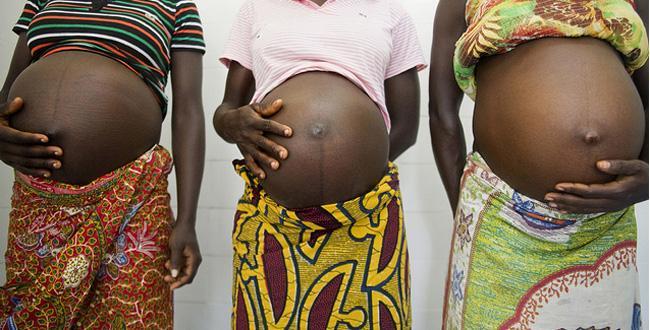Children as young as nine years of age are registering for maternity services, something that exposes how Zimbabwean communities continue to allow the abuse of the girl child to go unreported.

As young as they are, nurses at some of the health institutions — especially those in extremely remote areas — are registering the under-age girls as expecting mothers.
Sadly, when they come seeking medical assistance some of them won’t even be aware that they are pregnant.
One nurse who identified herself as Kudakwashe Dzapasi said they always encourage the expecting girls to bring their parents or guardians along after running some pregnancy tests.
In cases where they come to register knowing they are pregnant, the nurses assess their condition and take down their names.
After that, they are made to pay maternity fees, before referring them to a hospital to be monitored until they give birth.
Reports that girls as young as nine years are giving birth have baffled many with doubting Thomases wondering if it is possible for a girl of that age to conceive.
A woman can get pregnant and have a baby as soon as she begins ovulating, or producing eggs.
This typically occurs about a year after they first begin menstruating, which usually happens between the ages of 11 and 12.
Some girls start ovulating late, though, and others, extremely early.
The early onset of menstruation is called “precocious puberty.”
Lina Medina, a Peruvian girl born in 1933, began menstruating at the age of eight months, was tragically raped as a five-year-old and gave birth at six years-five months.
She is the youngest confirmed mother in medical history.
The question that begs for an answer is; why are the perpetrators not being arrested?
In cases where reports are made to the law enforcement agents and girl-child lobby groups, justice is allowed to take its course.
Unfortunately, in places that are in the back of beyond, such cases often go unreported with religious beliefs and other backward cultural practices still holding sway.
In such places, under-resourced health workers that would have been overly patronised by their communities often allow the perpetrators to get away with it.
Marrying an under-age child is a serious crime in Zimbabwe which attracts a lengthy jail term.
Until January 2016, girls could get married age 16, while boys could marry at 18.
But on January 20, 2016, the Constitutional Court (Con-Court) ruled that section 22 of the Marriages Act was unconstitutional and therefore “no person, girl or boy should be married before the age of 18”.
The ruling followed a year-long case from 2015, where two former young brides — Loveness Mudzuru and Ruvimbo Tsopodzi — filed an application asking the Con-Court to declare the Marriage Act and Customary Marriage Act a breach of the new Constitution.
While the judicial judgment is a step in the right direction, there is still an urgent call for government to amend laws that are still at odds with the supreme law to end child marriage.
Child marriage violates the fundamental human rights of girls and boys, but disproportionately affects girls. This damaging practice prohibits girls from reaching their full potential for years.
“Girls are denied their right to a consensual marriage, as well as their right to an education, protection, economic engagement and reproductive health care,” Plan International said at the time of the landmark Con-Court ruling.
“Through our 18+ Ending Child Marriages project, Plan International has worked hard to ensure social and policy change is put in place, so we can eradicate all forms of child marriage.”
Statistics from the Zimbabwe National Family Planning Council show that Manicaland recently recorded the highest teenage pregnancy prevalence rates in the country.
The province’s prevalence rate stands at 27 percent which is above the national average of 22 percent.
Having nine-year-olds who are way below teenage-hood giving birth stunned Justice for Children Legal Education Programme (JCLEP) manager John Mhlanga who said impregnating such young people is a crime and should be reported to the police.
Mhlanga said it is news to him that nine-year-old children are registering for maternity services as the youngest case that his organisation came across was of a 14-year-old.
“I cannot confirm that nine-year-olds are getting married or pregnant but children surely are getting married. I have had opportunities to follow up on child marriage cases and the youngest so far was 14 years.
“As a matter of our reaction to these cases I can say for children who are nine years that is rape because they cannot consent to sexual intercourse in any way whatsoever,” he said.
The programme manager said government should ensure that those who take advantage of young girls are arrested as nine-year-old children are too young to indulge in sexual activities.
“If this is happening, the Health ministry ought to be responsible as well because they cannot register a nine-year-old child for maternity without notifying the police.
“They have a duty to eradicate child marriages hence such incidences must be reported to the police so that the culprits are charged with rape,” he added.
JCLEP is working on implementing a project aimed at ending child marriages, starting with Manicaland.
Already, the organisation is carrying out campaigns against child marriages in Mutare and Mutasa communities in Manicaland Province, as well as holding empowerment programmes in schools.
“To complement our efforts, we have also trained and strengthened community child protection mechanisms such as child protection committees that are campaigning against child marriages.
“We have strengthened empowerment programmes in schools to ensure that the campaign against child marriage is also done by children themselves in schools,” Mhlanga said.
Child marriages and pregnancies in rural area are usually fuelled by poverty.
Twenty-eight percent of the teenagers aged between 15 and 19 in Manicaland Province have reportedly begun child bearing.
Child president Innocent Chikwanda recently has called on government to work hand in hand with junior parliamentarians to sterm teenage pregnancies. DailyNews.






